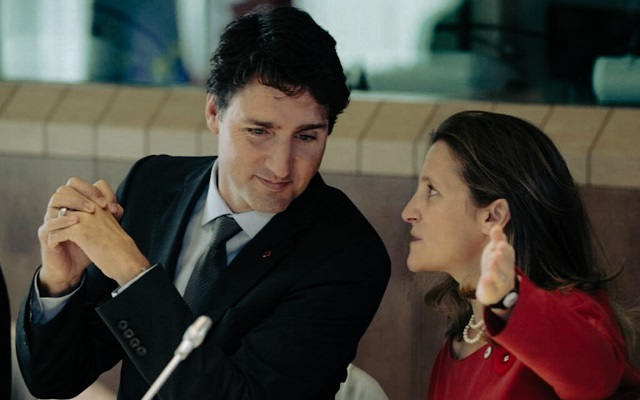Energy
Federal Greenwash law: guilty until proven innocent

From Resource Works
“Under this new law, you’re guilty unless you prove your innocence to some back-room bureaucratic body. That’s simply not a Canadian concept.”
In its latest display of environmental correctness, the federal government passed a new anti-greenwashing law that requires individuals or organizations making claims or promises about the climate benefits of products or processes to prove their truth.
Such “truth,” the law stipulates, must be proven to the satisfaction of a federal bureaucracy — by way of “an adequate and proper test” or “adequate and proper substantiation in accordance with internationally recognized methodology.”
However, those tests and methodologies have not been defined or announced, remaining hopelessly vague. A federal bureaucrat is now empowered under the law to review such climate statements and claims, and to compel court proceedings if they deem them not to meet the ambiguous criteria.
It’s clear the law (Bill C-59, amendments to the Competition Act) would apply to companies claiming, for example, that their production processes or new technologies will reduce greenhouse gas emissions. However, the Competition Bureau conveniently will not have to prove that the claims are false or misleading. The new law instead requires the accused company or agency to prove their innocence.
The penalties can be severe, with fines of up to $10 million ($15 million for repeat offenders) or as much as three times the benefit derived from the misrepresentation. If that benefit cannot be reasonably determined, the penalty could be up to three percent of the company’s annual worldwide gross revenues.
Canada is thus following the green correctness of the European Parliament, which now requires “proof” of claims of a neutral, reduced, or positive impact on the environment when a producer reduces or offsets emissions.
The European Union’s move followed a study by the European Commission, which found more than half of green claims were vague, misleading, or unfounded, with 40% being “completely unsubstantiated.”
Industry in Canada has been quick to protest Bill C-59, and it’s not just the oil and natural gas sector raising concerns. Industries ranging from automotive to mining to manufacturing are also challenging the new law.
Dennis Darby, CEO of the Canadian Manufacturers & Exporters Association, called the changes “quite heavy-handed” and said his member companies worry about potential legal challenges over any environmental claims they make about emissions-reducing technologies.
The Canadian Association of Petroleum Producers (CAPP) also protested: “These amendments effectively silence discussion around climate and environmental policy for political gains, while promoting the voices of those most opposed to Canada’s oil and natural gas sector.
“The federal government’s approach to these amendments has introduced a new level of complexity and risk for those looking to invest in Canada. The amendments to the Competition Act will make it more difficult for proponents to speak to Canadians and gain public support for their projects, particularly for those focused on reducing emissions.”
CAPP argued in a submission to the Competition Bureau: “The effect of this legislation is to silence the energy industry and those that support it, in an effort to clear the field of debate and promote the voices of those most opposed to Canada’s energy industry.
“Implementing a vague law with exceptionally high penalties, without consultation, and with an outsized impact on the country’s largest industries, is both anti-democratic and anti-business.”
Will the new Canadian law also apply (as CAPP says it should) to climate campaigners and green groups who claim that a company, product, or process damages the global climate?
One green group recently attacked liquefied natural gas (LNG) developments in British Columbia using (among other things) a photoshopped image of a smoke-emitting oil and gas facility in Iran. Could that be prosecuted under the new law? It should be, but who knows?
Will the new reverse-onus law apply in practice to government departments, ministries, and ministers? Again, who knows?
The federal Canada Energy Regulator, for example, made a number of green statements in a recent Market Snapshot about LNG in BC:
- “LNG Canada is actively working on electrifying certain processes, especially for the proposed Phase 2. This shift will reduce reliance on fossil fuels and help lower the carbon intensity of LNG production.”
- “Woodfibre LNG will use electric motors powered by renewable electricity from B.C. Hydro, making the project one of the lowest-emission LNG export facilities in the world.”
- “The proposed Cedar LNG facility will also be powered by renewable electricity from B.C. Hydro and will be one of the lowest-emission LNG facilities in the world.”
- “The proposed Ksi Lisims LNG facility would have one of the lowest carbon intensities of large-scale LNG export projects in the world, utilizing several technologies to reduce carbon emissions, including renewable hydropower from the B.C. electricity grid.”
- “The Tilbury LNG facility is powered by renewable hydroelectricity, which means it can produce LNG that is nearly 30 percent less carbon-intensive than the global average.”
Does the Canada Energy Regulator now have to “prove” all those statements?
And what about Prime Minister Trudeau himself? The First Nations LNG Alliance (which has said the law could be used as one more tool to discourage Indigenous partnerships and investment in energy projects) asked if the law would apply to the prime minister.
“Prime Minister Justin Trudeau hailed the go-ahead decision by the Cedar LNG project, majority-owned by the Haisla First Nation in B.C. He said it will be ‘the world’s lowest carbon footprint LNG facility.’ So does the prime minister now have to ‘prove’ that Cedar LNG is the world’s lowest carbon footprint LNG facility?”
Regardless, under this new law, you’re guilty unless you prove your innocence to some back-room bureaucratic body. That’s simply not a Canadian concept, nor a Liberal one. This new law needs to be changed or repealed.
Alberta
Oil Sands are the Costco of world energy – dependable and you know exactly where to find it

From Resource Works
Canada’s secret energy advantage: long life, no decline
Frankly, Canadians should hold the oil sands in higher esteem. The more I see how the world really works, the prouder I am of this resource.
When Fatih Birol, Executive Director of the International Energy Agency, speaks, the world listens. His latest warning is blunt: decline rates are the elephant in the room for global energy.
Oil and gas fields almost everywhere face natural decline. Shale wells lose about 70 per cent of their output in the first year. Many conventional reservoirs also taper off, often in the range of 5 to 7 per cent annually, though actual decline rates vary widely depending on geology and field management. The result is that nearly 90 per cent of global upstream spending now goes simply to replacing lost supply.

Fatih Birol, Executive Director of the International Energy Agency, at right with the author in Winnipeg in 2017.
Birol estimates that it is taking about $500 billion a year just to keep the industry running in place. If that stopped, the world would lose the equivalent of Brazil’s and Norway’s combined production every year. That’s how steep the slope has become.
Which brings us to Canada’s quiet advantage. Our oil sands — especially the mining and upgrading projects in northern Alberta — don’t behave like shale. Once built, they produce steadily for forty years or more. No frantic drilling treadmill. No production cliff.
Oil sands insiders call this the “long life, no decline” advantage.
It may sound like inside baseball. But in energy economics, this distinction is huge. In fact, it’s so critical that one of the nation’s largest energy producers, Calgary’s Canadian Natural Resources, recently devoted an entire investor slide to it, spelling out the contrast between shale and oil sands. When a major company takes the trouble to educate even sophisticated investors, you start to suspect the point isn’t as widely understood as it should be.


Another underappreciated benefit of this advantage is what it makes possible on the decarbonization front. Because oil sands production is steady for decades, these assets provide a stable platform to deploy major emissions-reduction technologies — carbon capture and storage, small modular nuclear reactors, advanced heat recovery. These are not quick fixes; they require billions in upfront capital and long timelines to pay back. That kind of commitment makes little sense if your underlying resource base is collapsing year after year. Canada’s stability means we can make those big bets. When Prime Minister Mark Carney refers to “decarbonized oil”, some might dismiss that as magical thinking, but I’m pretty sure what he means is oil sands deposits that can be subject to long-term, intensive efforts to do all of these things – a luxury not available to those whose eggs are all in the drilling basket.
But there’s a bigger geopolitical conversation here. Surely if the United States wants to secure abundant oil in its own “backyard,” the logical step would be to ensure there is enough pipeline capacity from Canada. We’ve been here before with Keystone XL. The project became a political lightning rod, but the fundamental logic has not changed: the U.S. and their refineries will need reliable long-life oil for decades to come. Canada has it. The question is whether Washington is prepared to act in its own strategic interest.
That means the long life, no decline message is not just an investor presentation footnote. It’s a fact that needs to be recognized in Ottawa, in Washington, and across the Canadian public. In Ottawa, because policymakers must grasp that the oil sands are the crown jewel of Canada’s resource economy.
What Washington needs to keep front of mind is that Canada is not just a friendly neighbour — we are a cornerstone of North American energy security. Canadians, whose views have been shaped by years of opposition campaigns that tried to make us ashamed of the oil sands, seem to be open again to the possibility that energy is more complicated that polarized public debates often make out.
Frankly, Canadians should hold the oil sands in higher esteem. The more I see how the world really works, the prouder I am of this resource.
To understand in more detail what this long life, no decline phrase is all about, think of it this way. For decades, the global oil system has resembled hunting and gathering. Companies poke holes in the ground, chase short-lived wells, and then move on to the next patch. Technology has reduced the uncertainty, but the feel is still primitive — like a parent rushing to the corner store every night for a quart of milk. It works, but it’s expensive, unreliable, and not built for the long haul.
Canada’s oil sands are the opposite. They are the Costco of energy: a big-box supply that doesn’t run out after one trip. Instead of scrambling for the next well, the resource is completely known, concentrated in one place, and designed for decades of steady output. That allows entire communities, supply chains, railroads, and international ports to grow around it. The oil sands are less like hunting and more like a factory — stable, predictable, and always in stock.
If Costco can sell loyalty with a simple membership card, why can’t we brand Canada’s enduring energy advantage just as boldly?
Great observers of energy markets like Daniel Yergin and Anas Alhajji have hinted at this for years: decline is relentless, durable resources are rare, and those who hold them wield strategic power. The IEA’s latest report confirms it. Four out of five barrels of oil today come from fields already past peak. Nine out of ten cubic metres of natural gas come from the same category. The world isn’t just chasing new demand growth — it’s sprinting to replace what geology is taking away.
And indicators are that American oil producers sense the easy years of global oil dominance are fading fast. “The US shale business is broken,” said one executive recently, according to the Financial Times. “What was once the world’s most dynamic energy engine has been gutted by political hostility and economic ignorance.”
That’s why Canada’s message has to be clear and confident. This is not the time to downplay the value of our oil sands. It’s time to explain, unapologetically, that in a world of decline, Canada’s long-life, no-decline resources are indispensable.
Energy
Indigenous Communities Support Pipelines, Why No One Talks About That

John Desjarlais of the Indigenous Resource Network and Norway PM Jonas Gahr at 2024 Arctic Frontiers Conference
From the Frontier Centre for Public Policy
Many Indigenous communities support pipelines and resource projects—but their voices are often drowned out by noisy activists and media narratives. Engineer and policy expert John Desjarlais, who works closely with First Nations, explains what Indigenous communities actually want and why their perspectives are ignored. Projects like Cedar LNG and Woodfibre LNG show Indigenous leadership and co-governance in action. Natural resources are foundational for Canada—and his vision might surprise you. (45 minutes)
-

 Alberta11 hours ago
Alberta11 hours agoFact, fiction, and the pipeline that’s paying Canada’s rent
-

 2025 Federal Election19 hours ago
2025 Federal Election19 hours agoProtestor Behind ‘Longest Ballot’ Chaos targeting Poilievre pontificates to Commons Committee
-

 illegal immigration2 days ago
illegal immigration2 days ago$4.5B awarded in new contracts to build Smart Wall along southwest border
-

 International2 days ago
International2 days agoMelania Trump quietly reunites children divided by Ukraine war
-

 COVID-191 day ago
COVID-191 day agoThe Trials of Liberty: What the Truckers Taught Canada About Power and Protest
-

 Business1 day ago
Business1 day agoUN, Gates Foundation push for digital ID across 50 nations by 2028
-

 International1 day ago
International1 day agoHamas releases all living hostages under Trump peace plan
-

 Business1 day ago
Business1 day agoTruckers see pay surge as ICE sweeps illegal drivers off U.S. highways







